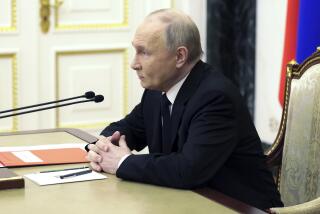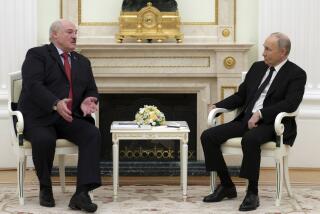Colombia president announces peace talks with FARC rebels
BOGOTA, Colombia — Prospects for an end to more than four decades of armed rebellion in Colombia inched closer to reality Tuesday as President Juan Manuel Santos announced that his government had agreed to start peace talks with the country’s largest insurgent group.
The first open negotiations in a decade between the government and the Revolutionary Armed Forces of Colombia, or FARC, will start early next month in Oslo and then shift to Cuba, and will span “months, not years,” Santos said. He was referring to the open-ended, three-year talks that collapsed in 2002 after accomplishing little more than disillusioning most Colombians and leaving the FARC militarily stronger.
Santos is taking a political risk in launching new negotiations after that failure: Many Colombians, including his predecessor, former President Alvaro Uribe, remain openly skeptical that an agreement with the rebels can be reached and even critical of efforts to try.
Conscious of that cynicism, Santos said he personally was accepting responsibility for launching the negotiations.
“There comes a moment in history when you have to take risks to arrive at a solution,” Santos said during his 18-minute speech broadcast from the presidential palace in Bogota. “This is one of those moments.”
Santos said he was taking the chance in hope of ending “once and for all this violence between sons of the same nation.”
The president acknowledged that he feared raising false hope. He cautioned that an agreement signed with the FARC last month is not a peace deal but a “road map” for a process that will have to yield quick and measurable results, suggesting limited patience. He said military operations would continue unabated.
Alvaro Jimenez, director of the Colombian Campaign Against Mines, a civil society group, said both sides come to the peace table in weakened positions. The FARC has lost standing militarily and morally with battlefield setbacks, its kidnappings and alleged drug trafficking. The government, meanwhile, has been stained by links to right-wing paramilitary groups and an estimated 3,000 extrajudicial killings over about 15 years.
“The prospect of peace is an opportunity for reconciliation among Colombians fed up with massacres, political alienation, persistent inequality and the exclusion of huge sectors of the society,” Jimenez said, adding that 10,000 Colombians have been killed or wounded by land mines over 20 years.
As for the timing of the talks, there are possible motives for each side.
Asked to explain the president’s motivation, political science professor Bruce Bagley of the University of Miami said peace would “guarantee Santos’ place in history.”
“He is betting a lot on his ability to pull off a peace accord,” Bagley said. “If he can’t, and I am skeptical that it will work, he will call it off within a year and declare all-out war on the FARC.”
Eric Farnsworth, vice president of the Council on the Americas and a White House staffer under President Clinton, said battlefield reversals that the rebels have suffered over 10 years were a key factor in driving the agreement. An estimated half of the 18,000 fighters the FARC had a decade ago have deserted or died.
“The rebels realize that waiting longer will reduce their negotiating leverage further,” he said.
According to terms worked out over six months of exploratory talks, the negotiations will focus on forging agreements on five main themes: agrarian reform; the rebels’ post-accord political participation; reintegration of the rebels in society; an end to drug trafficking, which the FARC allegedly uses to finance its activities; and ensuring the rights of the conflict’s victims. Representatives of the Venezuelan and Chilean governments will act as facilitators.
At a brief news conference in Havana, representatives of the FARC showed a video of leader Timoleon Jimenez saying that despite the possibility that the Colombian government “will play the same tricks as last time,” the rebels agreed to negotiate because “peace is worth taking on the most difficult challenges.”
The rebels previously insisted that negotiations take place in Colombia and that they be granted a demilitarized zone, conditions they are waiving this time.
Founded in 1964 by Pedro Antonio Marin, alias Manuel “Sure Shot” Marulanda, the FARC gained strength throughout the 1980s and 1990s, overrunning several police and army bases and appearing on the verge of encircling Bogota, the capital.
But the mismatch ended with the $8-billion Plan Colombia aid package funded by U.S. taxpayers that began in 2000 and helped convert government armed forces into formidable fighting units.
Kraul is a special correspondent.
More to Read
Start your day right
Sign up for Essential California for news, features and recommendations from the L.A. Times and beyond in your inbox six days a week.
You may occasionally receive promotional content from the Los Angeles Times.






